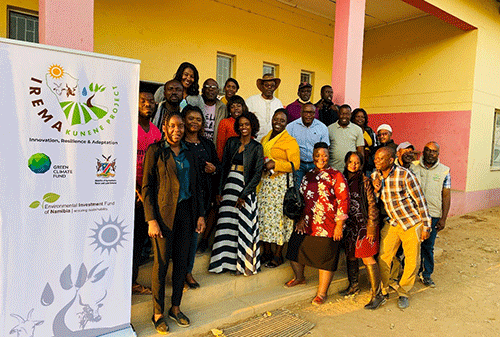The 'Improving rangeland and ecosystem management practices of smallholder farmers under conditions of climate change in Sesfontein, Fransfontein, and Warmquelle areas of Namibia' under the auspices of the IREMA Kunene Project, conducted a training of trainer’s workshop on gender mainstreaming from 12 to 15 July 2022 in Opuwo and Khorixas.
The project, funded by the Green Climate Fund (GCF), is being implemented by the Environmental Investment Fund of Namibia (EIF) in conjunction with the Ministry of Agriculture, Water and Land Reform (MAWLR). The training is aimed at strengthening the capacity of the IREMA staff, key stakeholders and beneficiaries, to address gender inequalities in the various project interventions; and appreciate social inclusion as a strategy that is required to enhance the effective project implementation.
In her welcoming remarks, Mirjam Kaholongo, the national project manager encouraged trainees to openly unpack gender issues affecting them. This will aid the project implementers to identify and address key bottlenecks to gender inequality to ensure gender consideration into project activities. She further emphasised that gender equality and women’s empowerment is a cornerstone of effective climate action, therefore it is imperative to make the vital connections between gender, social equity, and climate change.
Presenting the essence of the workshop, Kredula Shimwandi (EIF - Gender Young Professional) highlighted the commitments of Environmental Investment Fund of Namibia’s (EIF) towards promoting gender equity and equality between women and men throughout the project implementation period.
"We have areas of gender implementation, whereby the gender policy is imbedded into all policies and programmes of the Fund, to integrate the objective of gender equality in policy partnerships, advocacy and dialogue, public engagement and communications in order to address gender gaps and unequal power relationships that exist,’’ she emphasised.
According to the gender expert, Dr Mogotsi Immaculate from the University of Namibia, male and female entitlements, duties and responsibilities are divided along gender lines, with males making most decisions whilst women are responsible for most of the household chores and have limited or no decision-making power within their households and communities. The gender division of labour, coupled with unequal decision-making power and control over household, land and community resources provides males and females with deferential opportunities to adapt to climate change.
She further stressed that involving both women and men in all processes of climate action is a significant factor in meeting the climate challenges. "Teach our boys and girls how to carryout daily activities without discriminating them based on their gender roles to build resilience and ability to address climate change.’’ Mogotsi said.
Sakeus Shilomboleni, the EIF - Environmental and Social Safeguard Officer closed the workshop, highlighting that it was an important opportunity to spotlight the gender gaps and barriers that exist in the Kunene Region and setting the tone with the participants on what is expected of them in terms of gender mainstreaming through the IREMA project. While mainstreaming is clearly essential for securing human rights and social justice for both men and women, it also increasingly recognises that incorporating gender perspectives into different areas of development ensures the effective achievement of other social and economic goals.
He further encouraged the project beneficiaries to become champions of gender mainstreaming upon returning to their respective communities, with continuous guidance from key stakeholders in their localities.


